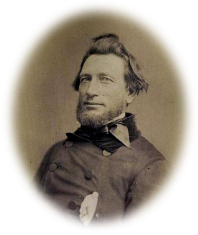11th.–At 5 o’clock, A. M., as clear and calm a morning as ever a bright and beautiful moon shone on. We struck tents and took up our line of march in the direction of Fredericksburg, only five miles distant. At a quarter before 6, precisely, the heavy reports of two large guns came booming through the woods, telling us that the ball was opened. The sound came from Falmouth. Frequent and more frequent came the peals, and in half an hour, so constant was the roar that the intervals between the reports was undistinguishable. At 11 o’clock, A. M., we are in line of battle along the north bank of the Rappahannock, about two miles below Fredericksburg. A pontoon bridge is nearly completed just in front of us. The artillery fight at Falmouth continues; our troops are pouring into the plain along the river. Will the enemy contest our passage! Doubtful.
At 11 1-2 o’clock, I sit on my horse, on a high ridge overlooking Fredericksburg, Falmouth, the river, and the vast plains on either side, where the hosts of both armies are marshalling for the great trial. How beautiful the plains, the cities, the river! How grand the tout ensemble! How different may be the scene on which the rising moon of tomorrow morning may shed her silver light.
“On Linden, when the sun was low,
All bloodless lay the untrodden snow,
* * * * * * * *
But Linden saw another sight
When the drums beat at dead of night,
Commanding fires of death to light
![]()
![]() The darkness of her scenery.”
The darkness of her scenery.”
![]()
Oh, beautiful Rappahannock! are you on this most beautiful day to take the dark rolling Yser for your type? And must this bloodless and untrodden snow, e’er another rising sun, be stained by the blood of valiant hearts, struggling in the cause of government and humanity, against anarchy and oppression? I am at this moment notified of my appointment as a ” Chief operator” for General Howe’s division, during the approaching battle, and am ordered to duty. This is a most flattering distinction, but I rather regret it, as it takes me from the scenes of the field.
3 P. M.–Having prepared my hospital, and the fight not having commenced in our division, I have ridden to Fredericksburg, two and a half miles, and, for the first time, witnessing the bombarding of a city. Rebel sharpshooters are concealed in the houses, and have been shooting our pontooniers. The city is already on fire, and thus ends this ancient town, where children, and children’s children, have lived and died in the same house, for generations. Alas! their homes are destroyed and they homeless. To them the seat of their acutest joys and sorrows, of their hopes and their fears, their histories, and their traditions will be known no more forever. But how strange that I should sit here writing on horseback, almost in the midst of their sharpshooters, without being able to reason myself into a sense of my danger! Have I a life charmed against such exposure, that I should be thus insensible to it? However, if some were here, who have an interest in this matter, co-ordinate with myself, they would say “Go!” and I will do it. Come, Joseph,1 yours is not a charmed life, and you at least must be taken away.
Night has come, and we have not crossed the river. Rumors are rife, that the enemy has evacuated. I do not credit them.
1 My faithful and affectionate horse.
